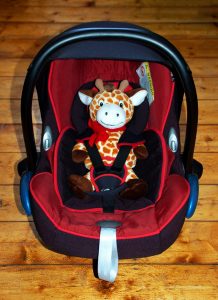New research suggests parents should leave their children in rear-facing car seats until they have outgrown them.
While it’s unclear when Florida will update its own recommendations, parents and caregivers should start using the new guidelines as soon as possible. USA Today reports the new car-seat guidelines for rear-facing seats are designed to save lives. Safety advocates now say children should use the seats until they reach the height and weight limit suggested by the manufacturer. Newer, stronger seats are allowing parents to use them for larger children.
Previous guidelines suggest use of rear-facing car seats until a child reached the age of 2.
“Fortunately, car seat manufacturers have created seats that allow children to remain rear-facing until they weigh 40 pounds or more, which means most children can remain rear-facing past their second birthday,” said Dr. Benjamin Hoffman, lead author of the policy statement and chair of the AAP Council on Injury, Violence and Poison Prevention. “It’s best to keep your child rear-facing as long as possible. This is still the safest way for children to ride.”
New Car Seat Guidelines
The new guidelines were prompted in part by a 2016 legal case that held a car-seat manufacturer responsible for life-altering injuries to a 20-month-old child in a front-facing seat because the manufacturer did not warn about the risks of changing from a rear-facing seat.
After switching to a front-facing seat, the new guidelines suggest children use safety seats and harnesses as long as possible, often until reaching a weight of 65 pounds. Thereafter, children should be put in a booster seat, until lap and shoulder belts fit properly, typically when a child reaches about 4’9″ in height.
While compliance with car-seat rules for toddlers has improved in recent years, older children are still less likely to use them. In the event of a traffic collision, using the correct car seat or booster seat reduces the risk of death or serious injury by 70 percent. Safety advocates remind parents that car crashes remain a leading cause of death among young children — killing an average of 4 children a day under the age of 14.
Under Florida law, F.S. 316.613 Child Restraint Requirements, require crash-tested, federally approved, child-restraint devices for children under the age of 5. Florida Department of Highway Safety and Motor Vehicles urges parents to keep all children in rear seats until at least the age of 12, as front-seat airbags can be particularly dangerous to young children.
Manufacturers of car-seats also have an obligation to the safety of children, as long as these seats are used properly. Unfortunately, car-seat recalls are common. Our injury lawyers in Fort Myers and Naples encourage parents to find a seat that is age- and fit-appropriate for their child and to check for recalls or warnings issued by the government or manufacturer.
If you or a loved one is injured, call Associates and Bruce L. Scheiner, Attorneys for the Injured, at 1-800-646-1210.
 Florida Injury Lawyer Blog
Florida Injury Lawyer Blog





